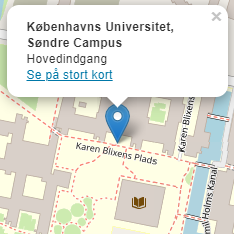Begærets Subjekt og Informationskompetence
En re-installering af subjektet
Niels-Peder Osmundsen Hjøllund forsvarer sin ph.d.-afhandling.
Begærets Subjekt og Informationskompetence – en re-installering af subjektet tager udgangspunkt i informationskompetencebegrebet og et kvalitativt studie af to gymnasieklasser på to forskellige gymnasier i Storkøbenhavn.
Afhandlingen er et teoretisk analytisk arbejde, der gennem et empirisk studie undersøger, hvorvidt en lacaniansk tilgang til subjektbegrebet kan supplere og udvikle forståelsen af informationskompetencebegrebet. Undersøgelsen har som udgangspunkt følgende to spørgsmål:
- Hvordan påvirker et socialt medie som Facebook forståelsen af koblingen mellem rummet i og
udenfor undervisningssituationen, og på hvilken måde påvirker brug og ikke-brug rammen for
undervisningssituationen? - Kan en psykoanalytisk tilgang til subjekt og subjekt-positioner udvikle og udvide forståelsen for
informationskompetencebegrebet, og derved supplere det teoretiske grundlag for
informationskompetenceforskningen?
Afhandlingen introducerer en lacaniansk tilgang til subjektet som blik på informationskompetencebegrebet. Det undersøges gennem en kvalitativ undersøgelse af to forskellige gymnasieklasser ved brug af observation og interviews, hvorledes brug og ikke-brug af sociale medier påvirker undervisningssituationen. Afhandlingen argumenter for, at der, ved at tage udgangspunkt i begærets subjekt, er mulighed for at komplementere og udvide de sociokulturelle og diskursanalytiske forståelser af informationskompetence. Afhandlingen konkluderer, at psykoanalysen kan komplementere de sociale tilgange, idet den er velegnet til at forstå de strukturelle forhold mellem subjektet og det sociale. Den kan tillige udvide synet på, hvordan vi relaterer til digitale- og sociale medier, og samtidig er den i stand til at tage livtag med brud og glidninger mellem diskurser på en ny måde.
The Subject of Desire and Information Literacy – A reinstallation of the subject takes it point of departure in the concept of information literacy and an empirical study of two high school classes at two different high schools in the Greater Copenhagen area. The thesis is an analytical theoretical work that utilizes an empirical study of the aforementioned classes to investigate in what way a lacanian view on subjectivity can complement our understanding of the concept of information literacy. The investigation takes its departure in the following questions:
How does social media such as Facebook affect the understanding of the relation between the space
inside and outside the classroom and in what way does use and non-use of social media affect the
framing of the teaching situation?- Can a psychoanalytical approach to subject and subject positions develop and expand the
understanding of the concept of information literacy and thereby supplement the theoretical basis of
information literacy research?
The thesis introduces a lacanian view on subjectivity as lens on the concept of information literacy. Through a qualitative empirical study of two different high school classes employing observation and semistructured interviews it investigates how use and non-use of social media affects the teaching situation. The thesis argues that by taking the subject of desire as a point departure, we are able to complement the sociocultural and discourse analytical approaches to information literacy. The thesis concludes that psychoanalysis can be utilized as an approach to information literacy that can complement the social approaches in that it is well suited to understand the structural relationship between subject and society, human and digital media, and the ability to grasp breakdowns and slippages between discourses in new ways.
Bedømmelsesudvalg
- Lektor Camilla Moring, formand (Københavns Universitet)
- Professor Olof Sundin (Lunds Universitet)
- Lektor Kirsten Hyldgaard (Aarhus Universitet)
Leder af forsvarshandlingen
- Lektor Laura Skouvig (Københavns Universitet)
Et antal eksemplarer af afhandlingen vil blive fremlagt til gennemsyn og hjemlån inden forsvaret i Det Kgl. Biblioteks information på Københavns Universitet Amager og til gennemsyn på Det Kgl. Biblioteks læsesal Øst, Diamanten samt på Det Informationsvidenskabelige Akademi (IVA), Njalsgade 76, 2300 København S.

